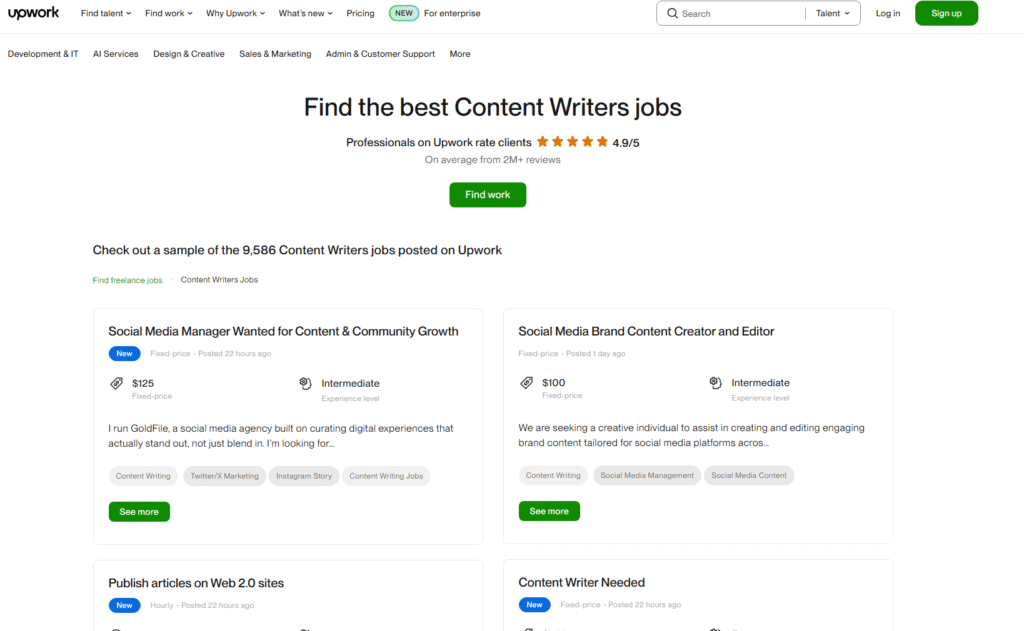One of the most common questions I get asked is whether my love for writing pays my rent and utility bills. For sure, I am usually hesitant to respond to such questions, but today, I will be completely transparent. To be able to benefit from writing fully, you must be willing to put in the “smart and hard” work together so as to be able to reap all the ripe fruits in it. For me, writing is not just a side hustle or a job, but it is a survival skill where each day presents new opportunities to learn and grow.
In Kenya, youth aged 15-34 face an unemployment rate of 67%, with this demographic comprising 35% of the Kenyan population. The competition for securing traditional jobs is becoming harder every day. However, the silver lining is that millions of Kenyan youth have access to internet connections, meaning that if they’re determined, they can earn online from various opportunities such as content writing, graphic design, and digital marketing.
For me personally, I have never failed to utilise any opportunity to try to have food on my table. My journey with writing started three years ago, a few years after joining university to study Mathematics and Computer Science. However, it wasn’t until during the COVID-19 lockdown period that I remember very well having the energy to engage fully in writing and coding simultaneously.
Fast-forward to date, I won’t say I’m a guru at it, but as I mentioned previously, I take each day as a chance to learn and embrace new ideas. The journey itself has its own fair share of ups and downs. I have made mistakes and learned from them, and while trying to give you a glimpse of my journey in this niche, I also try to share solutions and baby steps to get you started, plus what to avoid.
How Did I Break Into Writing with Zero Experience?
For many interested in writing or any online work in Kenya, freelance platforms have become what seems like a quick and easy route for anyone to venture into. That’s where I started too, but to be honest, they work well if you have the needed experience and skills—which wasn’t the case for me. I hope this doesn’t scare you, but if it does, you should know that there are alternative pathways that can work better for beginners.
When breaking into writing, skills are what matter the most. If this doesn’t make sense yet, below is the unfiltered roadmap of what worked (and what did not) for me, plus my advice on how to quickly grow, whether going independent or working for others.
Upwork, Fiverr, and Early Rejections

Upwork and Fiverr were some of the first platforms I tried looking for jobs on, but sadly, they didn’t work out for me because I lacked the skills needed to compete with other freelancers. Upwork alone has more than 18 million freelancers, so you can imagine how difficult it can be to get an entry-level role with competition both locally and internationally.
But the fact that it didn’t work for me doesn’t mean it won’t work for you. The journey is tough, but not giving up on what you believe in is really what matters. What no one told me when I was getting started is that you need to first develop the skills, have the right attitude towards the job, and have a portfolio to showcase your work.
Most freelance platforms operate on a bidding system, meaning that you must write a proposal to a client, convincing them why they should consider you over other freelancers who are also bidding for the same task. A good way to stand out is to have a portfolio to showcase your past projects.
Having a portfolio doesn’t mean that you have to build a website from scratch. Many free platforms today, such as Medium and LinkedIn, allow you to publish your work samples for free, which you can then share with your clients.
Pro Tip for Beginners: With zero experience, instead of looking for online content writing gigs on international platforms, you can source jobs directly from local job sites such as MyJobMag and BrighterMonday, since they have much lower competition for entry-level roles. Some platforms like NerdyTurtlez pay between KES 200 and KES 500 for every 250 words, making them excellent starting points for new writers.
The Power of Mentorship and Networking
My biggest breakthroughs with landing writing gigs have not been through freelance platforms but rather through networking with other professionals. When I realized that things were just not working for me, I accepted the opportunity to be mentored and be shown how the writing industry actually operates.
One of the challenges I faced when I first started blogging was launching my first blog in September 2021. I was naive and excited about writing and publishing my content, but then I couldn’t help but wonder why my posts were not performing even though I knew how to write.
However, it wasn’t until I sought mentorship that I realized that writing is not just about hitting the publish button but a chain of processes that requires proper research, outlining, drafting, proofreading, SEO optimization, formatting, and more.
As you can see, accepting coaching allows you to understand deeper elements you might not know. Additionally, it’s not just about gaining knowledge. If you become skilled at something, networking can open endless doors through referrals to many clients in the industry.
Networking Strategy That Works: Join local writing groups on Facebook, LinkedIn professional networks, and attend virtual writing workshops. Many Kenyan writers share opportunities within these communities before posting them publicly.
Landing Your First Paying Gig
If you’re going solo, it can be challenging, but the road less traveled sometimes tends to have better rewards. Aside from networking, what has worked for me in the past is pitching directly to editors. How does it work? If you’ve been eyeing a certain publication, reach out to the editor by pitching your request to contribute to their publication.
While doing so, make sure your pitch stands out by clearly stating what you want to write for them, why, and the unique angles you’re willing to bring to differentiate yourself from the rest.
A good pitch should usually be between 100 and 200 words. The approach I use to write pitches involves using AI generators such as ChatGPT as a starting point, but I always make sure to edit the output thoroughly to add a human touch before sending them for consideration.
Here’s a pitch template that has worked for me:
Subject: Article Pitch: [Specific Topic] for [Publication Name]
Dear [Editor’s Name],
I hope this email finds you well. I’m a Kenyan content writer specializing in [your niche], and I’ve been following [Publication Name] for [specific reason].
I’d love to contribute an article titled “[Your Proposed Title]” that would explore [brief description of your unique angle]. This piece would be valuable to your readers because [specific benefit].
My approach would include [2-3 key points you’ll cover], and I can deliver [word count] words within [timeframe].
I’ve attached two writing samples that demonstrate my expertise in this area.
Thank you for considering my pitch. I look forward to potentially contributing to [Publication Name].
Best regards, [Your Name]
Important Tip: Avoid mentioning compensation in your initial proposal; focus on what you want to deliver first. If you’re accepted and your work is good enough, you’ll be hired when opportunities arise.
Building a Blog and Battling Google’s Algorithm

If you decide to venture on your own and start your own blog, you should know that blogging in Kenya has evolved significantly over time. It’s not as straightforward as it was in the past, but it’s a niche that still pays well if done correctly.
Personally, I can’t deny that blogging has worked for me in the past, not just in terms of earnings but also industry exposure. The best way to scale your blog quickly is through experimentation and knowing how to set yourself apart from competitors. Your monetisation channels also count toward earning revenue from your blog. Some of the best ways to earn through blogging in Kenya are via Google AdSense, affiliate links, and sponsored posts.
My Costly AI Mistake and Google’s Response
When you’re starting with a blog, one of the temptations you may face is using AI tools to write extensively. Here’s my honest take: while AI is already becoming integral to content creation, relying on it too heavily can be detrimental. My regrettable mistake was using tools such as ChatGPT excessively, and honestly, it worked for me initially until Google made algorithmic changes from time to time.
The Google core updates are Google’s means of promoting websites to rank better in search results or downranking them. As of 2025, Google heavily favors websites that display high levels of E-E-A-T (Experience, Expertise, Authoritativeness, and Trustworthiness).
What I Learned: Google’s algorithms have become sophisticated at detecting AI-generated content that lacks human insight and personal experience. The key is not avoiding AI entirely, but using it as a research and editing assistant while ensuring your content reflects genuine expertise and personal insights.
2025 and Beyond: What Works and What Doesn’t
What worked for me in previous years is not what still works today. Times are evolving, and with the rise of artificial intelligence and other technologies, producing content is becoming easier than ever. However, with any changes, the sooner you adapt, the easier it becomes to scale successfully.
The Dos
1. Niche Expertise: Google favors content that shows authority, and the best way to demonstrate that is by finding a topic in which you have genuine expertise. There are numerous niches you can explore, from SaaS, finance, and SEO to academic writing, health, and technology. Choose one where you can consistently demonstrate deep knowledge.
2. Localized Content: If you’re going to build a blog, the best way to grow is by attracting loyal readers, and the most effective approach is writing about local stories and challenges while offering solutions that Kenyans can understand and implement. The best way to find ideas to write about is using keyword research tools like Ahrefs, Ubersuggest, and SEMrush to identify what Kenyans are actually searching for.
3. Multimedia Integration: To boost your blog engagement and make it appealing, add videos, infographics, podcasts, or interactive elements to make your content more engaging and shareable.
4. Consistency and Quality Over Quantity: Rather than publishing daily low-quality content, focus on creating comprehensive, well-researched pieces that truly help your audience solve problems or learn something valuable.
The Don’ts
1. Over-reliance on AI: While Google claims it focuses on rewarding quality content regardless of how it’s produced, recent core updates suggest otherwise. While I don’t advocate completely avoiding AI tools, when you do use them, thoroughly edit your content to add a human touch, personal insights, and genuine expertise before publishing to avoid being downranked by search engines.
2. Ignoring SEO Basics: Avoid small mistakes that can hurt your website rankings. This includes producing low-quality content while neglecting other factors such as keyword stuffing, thin content, technical issues like missing titles and meta descriptions, and poor linking practices. As a bonus, you can use tools like Neuron Writer, Surfer SEO, or Clearscope to optimize your content before publishing.
3. Chasing Trends Blindly: I can’t stress this enough—avoid writing about everything simply because it’s trending. Identify one niche that suits you and become exceptionally skilled at it. This builds your authority and makes you the go-to person in that space.
4. Neglecting Your Audience: Don’t write just for search engines. Your primary focus should always be creating content that genuinely helps your readers. When you solve real problems, rankings and revenue naturally follow.
FAQs
How long does it take to earn a meaningful income from content writing in Kenya?
From my experience, it typically takes 3-6 months to build enough skills and portfolio to earn consistently. However, some writers start earning within their first month if they focus intensively on skill development and networking.
What’s the average pay rate for Kenyan content writers in 2025?
Rates vary significantly based on experience and niche. Beginners might start at KES 1-3 per word for local clients, while experienced writers in specialized niches can command KES 5-15 per word or more, especially for international clients.
Should I focus on local or international clients?
I recommend starting locally to build confidence and a portfolio, then gradually expanding to international clients as your skills improve. Local clients often initially provide more consistent work.
How important is having a degree for content writing success?
While a degree can help with credibility, it’s not essential. Your portfolio, writing quality, and ability to deliver results matter more than formal education. I’ve seen successful writers from various educational backgrounds.
Should I focus on local or international clients?
I recommend starting locally to build confidence and a portfolio, then gradually expanding to international clients as your skills improve. Local clients often provide more consistent work initially.
Final Thoughts
The journey from a blank page to paying bills with writing in Kenya is absolutely achievable, as long as you approach it strategically. I’ve made these mistakes so you don’t have to repeat them in your content writing business. While these lessons represent just a fraction of what I’ve learned, I encourage you to research continuously, see what’s currently working, and make decisions that will serve your long-term success.
Remember, if you’re going to get started with content writing in Kenya, it begins with having confidence in yourself and starting where you are. You don’t need perfect conditions or complete knowledge; you need the willingness to learn, adapt, and persist through the inevitable challenges.
let me know how i can be of help to you in the comment sections below













